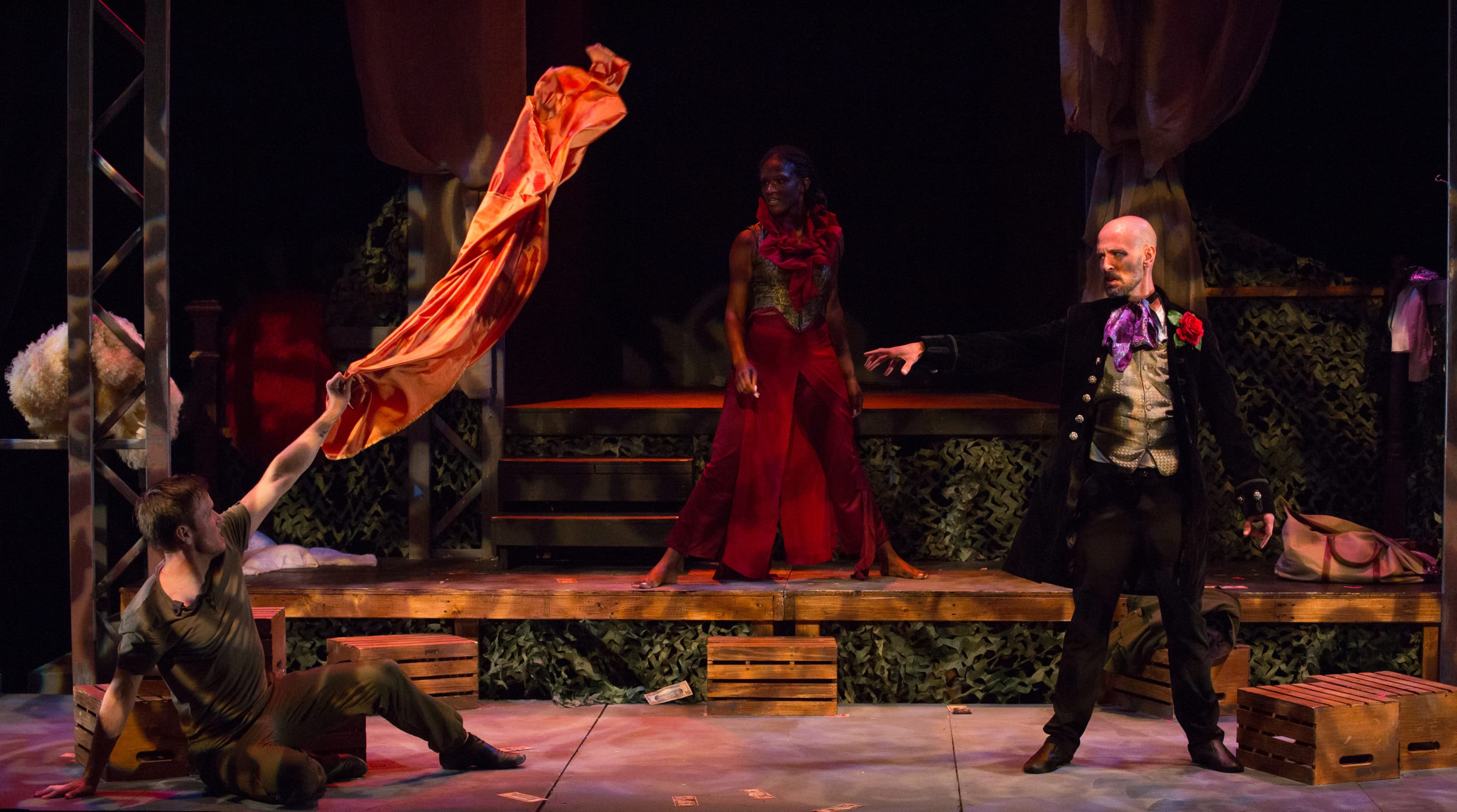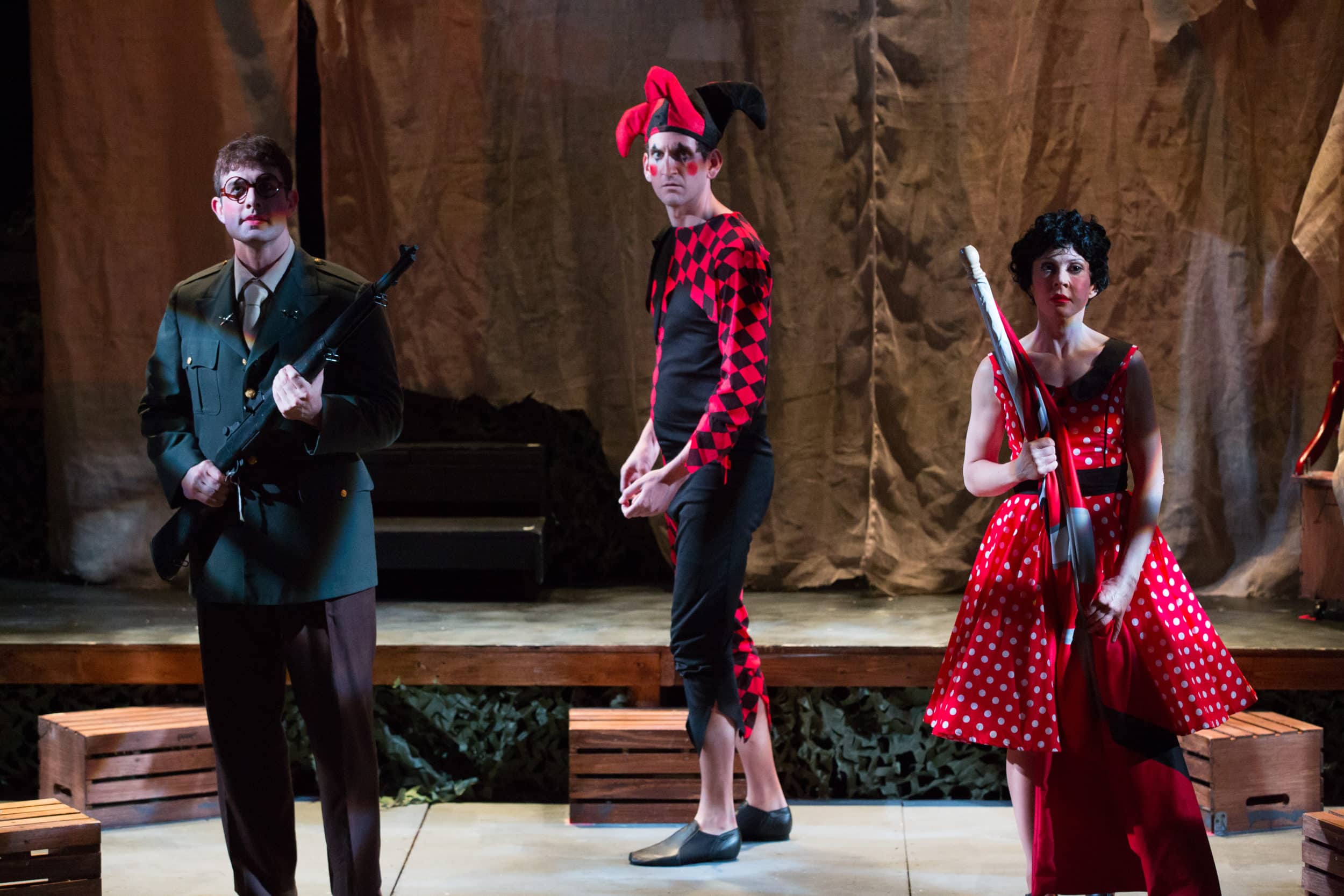“In the dark times
Will there also be singing?
Yes, there will also be singing.
About the dark times.”
― Bertolt Brecht
With unsettling powers of persuasion, compelling is the watchword for patrons at The In Series’ final production of the current season. Under Producing Artistic Director Carla Hubner’s leadership, The In Series has bravely brought together a daunting duo of performances. They are The Emperor of Atlantis or Death Goes on Strike by Viktor Ullmann and The Soldier’s Tale by Igor Stravinsky.

Each of the two may be short in performance run time, but together they are absorbing, darkly mocking, though sometimes uneven, musical journeys into rough wartime worlds. Both plays have been recently updated into English for contemporary audiences.
The two musical narratives are tales of resistance but from different time periods of the 20th century. The Soldier’s Tale, composed by Stravinsky (1882-1971), is rough-edged story-telling through the lens of “modernism.” It was composed in 1918, during the asymmetrical political and cultural aftermath of WWI’s death and destruction.
The second is Jewish Czech Viktor Ullmann’s (1898-1944) epic chamber opera The Emperor of Atlantis or Death Goes on Strike (1943). It was developed not long before Ullmann was on his way to the Nazi gas chambers of Auschwitz. It is difficult to think that Ullmann, in his final days of life in a concentration camp, came up with the creative energy sufficient to develop a composition about fascism in which even Death decides to go on strike against the powers-that-be.
The In Series evening began with The Soldier’s Tale with direction/choreography by Jaime Coronado and its new English language libretto by Rick Davis. The Soldier’s Tale is about a soldier struggling to make his way home from a war. The location is “somewhere.” The time and place could be anywhere. The audience and the stage proceedings are guided by a Narrator (Ashley Ivey). The weary soldier (Dimitri Gann) is unsure of what is in store for himself as he marches ever unaware (“March of the Soldier”) whispering to himself, “I’m going on.”
Along the way, he meets the Devil (Rosalynd Harris) and makes a bargain. For the soldier’s beloved violin (“The Soldier’s Violin”), the Devil will give him a book about economics that foretells the future and can provide the soldier with great riches. Well, that is what the Devil says. Add to possible great riches, on his way home, the soldier marries a princess (Harris again). The ending of The Soldier’s Tale leaves the audience to decide as to its ultimate meaning (“The Devil’s Dance”).
Under the music direction and effective piano work of Frank Conlon, the heady, primal violin of Gavin Fallow, and the punch and dash clarinet work of Breanna Gromicko, The Soldier’s Tale moves through seven Stravinsky musical numbers. The music has irregular moments with shifting rhythms that range from jazzy to ragtime, to classic waltz, to hints of Klezmer. The dancing, choreographed by Coronado, visually tracks the Stravinsky music. The dancing is not meant to be polished and glossy, but rather urgent and uncomplicated.
Needless to say, making a bargain with the Devil is like the art of the deal; one doesn’t really know the consequences. Who and what can be trusted? Is having money all there is? Can anyone have it all, or is that forbidden? The audience is left to ponder these and other questions Stravinsky left us.
After an intermission is the performance of the haunting opera The Emperor of Atlantis or Death Goes on Strike. Translator/Adapter and Director Nick Olcott seems to have new English updates providing reference points for contemporary times in America.

The opera centers upon an unnamed Emperor in a place that could be there or here, in a time that could be then or now. After winning a war, the Emperor takes on vast dictatorial power and brings forth policies to match (“Shut up, what is the point?). As the Emperor’s mouthpiece, a Drum Major says to the Emperor’s subject, “He and he alone speaks the truth.”
As the opera progresses, the Emperor (powerful baritone Andrew Thomas Pardini), his Drum Major (an almost flirty soprano Louisa Waycott in numbers such as “Do You Hear What He’s Saying”), and The Voice of the Loudspeaker (a vibrant bass-baritone Jarrod Lee hidden away with the orchestra) turn up the heat on the everyone to “not trust those who are different,” including The Girl (Randa Bouweyha) and The Boy (Samuel Keeler).
While one time lovers, they become unnerved, turning on one another. Even a once cheery Harlequin (clear tenor Adam Caughey) begins to wonder what is to be as he chats with Death (“On Stilts the Moon has left the Sky”). Over time as the Emperor becomes more of a monster sitting in his hidden away castle in the sky making pronouncements, even Death (a ringing, vibrant Andrew Adelsberger) becomes pissed off.
Death decides to teach the Emperor a lesson; he decides to go on strike to negate the Emperor’s source of power over his subject – the power of human death. Will resilience and survival triumph? Does humanity need death to give life meaning? There is plenty to ponder in The Emperor of Atlantis.
With vitality through 20 musical numbers of The Emperor of Atlantis, Music Director/Conductor Stanley Thurston led a finely-tuned chamber orchestra of 14. Instruments included violins, bass, flute, clarinet, trumpet, guitar, banjo, cello, oboe, alto sax, piano, and keyboard.
To know that it was written during the Holocaust by the composer leaves me speechless, as did each time the solo snare drum work of Chris Dechiara came to signify pronouncements and announcements. The movement and choreography by Pauline Lamb provided its own visual energy to match the musical compositions and the overall mood of the production.
The set design for both productions, by Jonathan Dean Robertson, used the same basic set befitting the desolation of a war-ravaged landscape for The Soldier’s Tale and a country under a no-man’s-land environment of The Emperor of Atlantis. It is a wooden riser with several smaller risers. There are a few wooden crates strewn about. One theatrical element is the use of a gauzy fabric curtain used for The Emperor of Atlantis to hide the Emperor from view at times. The costume design from Donna Breslin also befits both production and the character’s musical journeys. Costumes with the most visual interest were those for characters with a more comic presentation or for those with a grand entrance to make.
A question I have is this: will this particular production engage a younger, diverse, contemporary DC audience as it seemed to for the older patrons the night I took it in? My quick response is that for those acquainted and sympathetic to the messages and means of presentation of say, Brecht’s Mother Courage, or Weill’s The Three Penny Opera, and even Beckett’s Waiting for Godot, this show certainly can.
One final note: Carla Hubner has been the founding artistic director of The In Series for over three decades. This is the last production of her tenure. Hubner’s vision and implementation of The In Series of these years has made it truly one of Washington’s artistic gems. I stand to give Carla an ovation for her long very successful tenure.
Running Time: About 95 minutes, with one intermission.
The Emperor of Atlantis and The Soldier’s Tale presented by The In Series, plays through June 24, 2018, at the Atlas Performing Arts Center – 1333 H Street, NE, in Washington, DC. For tickets, call the box office at 202.399.7993 ext. 2, or purchase them online.




